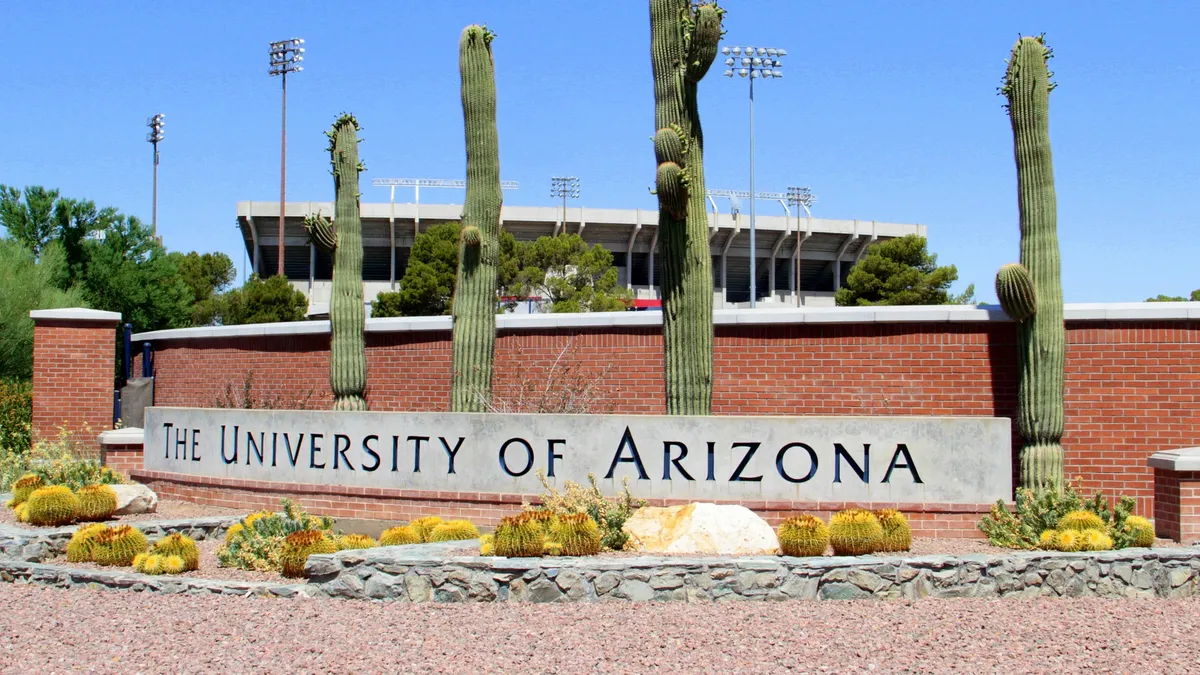College leaders in several states are staring down one of the worst possible outcomes of the summer: Coronavirus cases are surging just as they're preparing to welcome students back to campus.
The crisis is particularly acute in Arizona, Florida and Texas. All three states have recently been clocking upward of 3,000 new confirmed coronavirus cases most days in the past week, and have or soon could run out of intensive care unit beds at hospitals. Even though these states' testing capability has increased, so has the share of tests that have returned positive, a sign the virus is spreading.
In response to these trends, University of Arizona President Robert Robbins made a declaration last week. If he had to decide immediately, he said, he wouldn't reopen campus in the fall.
Coronavirus cases in Arizona have increased by 90% over the last two weeks, growing to more than 84,000 since March, and its test positivity rate is at 22.9%, rising a few percentage points during that period, according to COVID Exit Strategy, a website run by public health experts. Government officials have even activated an emergency plan that will let doctors deny treatment to patients based on their likelihood of survival in order to free up resources for others.
"We cannot have a situation where we're bringing students back to campus, asking our faculty and staff to come back to campus, when we're in truly an exponential growth in the number of cases here," Robbins said, according to the Arizona Republic.
His statement highlights the hard choices many college leaders have to make in just a matter of weeks. They must decide whether to go through with plans to reopen campuses, even though it can be notoriously difficult to predict whether regions will be able to slow the spread of the virus or prevent flare-ups before the term begins.
Many institutions made their reopening announcements before May 1, the deadline by which students typically must make their deposits, said Chris Marsicano, founding director of Davidson College's College Crisis Initiative, which is tracking how institutions are responding to the coronavirus. At that time, the crisis seemed relatively stable in some regions.
"The state of the world has changed," Marsicano said. "What looked like it could be in-person in May is now no longer looking like that."
Biding time
When the University of Arizona told students on April 30 that it planned to resume in-person instruction in the fall, it had just under 500 confirmed new daily cases. On Tuesday, it had more than 4,700.
Although Robbins recently expressed doubt about the university's ability to reopen safely, its website indicates it is still working toward having in-person classes in the fall term, though a detailed plan for how classes will be held has not yet been released. The university also paused bringing additional student-athletes back after consulting with local health officials, it announced Monday.
The university did not respond to Education Dive's request for comment sent Tuesday.
Arizona State University is also planning for a return to campus in the fall. But like many universities, it notes on its website that it will adjust operations as needed.
"Every plan that I've read has left it very clear that it could transition to remote at any time during the semester," said Alexandria Marsicovetere, a senior Hispanic studies major at Davidson College who is working on the College Crisis Initiative.
Some Texas colleges are also forging ahead with plans to reopen campuses in the fall. On Monday, Texas A&M-College Station laid out a plan for its fall term, which will include face-to-face and remote instruction.
The next day, the state logged nearly 8,000 new coronavirus cases.
"The spikes in these places have happened so quickly," said Alex Bloom, director of research at consultancy EAB. "I can understand why there maybe hasn't been communication about them yet because administrators have to wait and see a little bit on how these play out."
However, he's skeptical that a lot of colleges would opt for a remote term — even if there is widespread community transmission.
"The state of the world has changed. What looked like it could be in-person in May is now no longer looking like that."

Chris Marsicano
Founding director, College Crisis Initiative
Like most higher ed institutions, large public universities could lose out on key revenue if they don't reopen, such as from housing, bookstores and parking. In the 2019 fiscal year, for example, the University of Arizona brought in around $303 million in auxiliary revenue.
Instead, institutions would be more likely to follow in the steps of the California State University System, Bloom said. It is holding the majority of its courses remotely with exceptions for classes that are difficult to conduct virtually, such as research labs.
"That's still a big revenue hit," he said, "but it doesn't zero out."
When to change plans
Some institutions are adapting their plans to account for upswings in coronavirus cases.
The University of South Florida postponed bringing back more staff to campus in light of the state's coronavirus trends. After several weeks of troubling data, Florida broke its daily coronavirus record Saturday, with 9,585 new cases.
The university is staying in the first stage of a four-phase plan to gradually return employees and students to campus. "Our plan is designed to provide the flexibility to stay in phase I for several weeks if needed and still reach phase III, when many more students would return to our campuses, by the start of the fall semester in late August," a university spokesperson wrote in an email to Education Dive.
He added that the university would continue to monitor the latest coronavirus data, government orders and public health recommendations.
Colleges should be more transparent about what thresholds they're attempting to meet before they reopen campuses, said Robert Kelchen, a higher education professor at Seton Hall University. Some of those metrics could include known cases among students and employees or even in the county, he wrote in a recent blog post.
Institutions should also say how many cases they're willing to tolerate on campus, Kelchen added.
"If there are even a few cases on campus, they'll face pressure to close or to pull back campus operations," he said. "If colleges are upfront about, 'These are our plans for fall,' that might provide them some protection against public scrutiny.


















